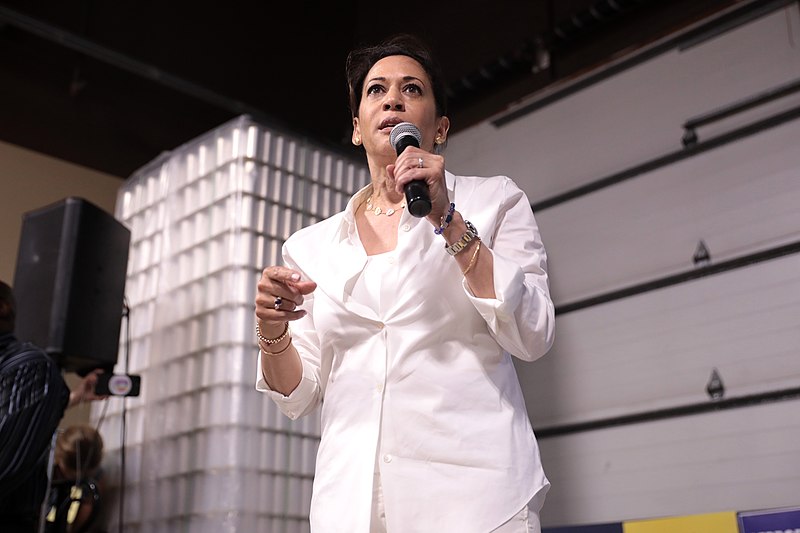- 14 3402-5578
- Rua Hygino Muzy Filho, 737, MARÍLIA - SP
- contato@latinoobservatory.org
 Foto: Gage Skidmore from Peoria, AZ, United States of America
Foto: Gage Skidmore from Peoria, AZ, United States of America
In March 2021, during an influx of unaccompanied migrant children, President Joe Biden tasked Kamala Harris with overseeing diplomatic efforts with the Northern Triangle. At the time, most minors detained at the southern US border were from El Salvador, Guatemala and Honduras – a region where major hurricanes and the coronavirus pandemic have had a devastating impact. Republicans rose to the task, dubbing Harris the “border czar” — a title the White House rejected, arguing her focus was on long-term solutions.
According to CNN, since being tasked with dealing with root causes, Kamala Harris has raised more than $4.2 billion in private sector commitments to address the root causes of migration from Central America, but border crossings remain high amid mass migration in the Western Hemisphere. Harris spoke lightly on the matter, as the situation along the US-Mexico border has become a political vulnerability for Biden.
Republican lawmakers have been tackling the issue since the beginning of the new Congress, and had plans to hold a hearing just hours before the president's State of the Union address on Tuesday. In turn, a senior government official maintained that Kamala Harris' work is not intended to solve immediate problems on the ground: "The vice president's job, and what we are focused on this afternoon, is to think long term and reach the root of the problem while the government simultaneously addresses the immediate challenges at the border,” he told reporters on Monday (6).
In addition to US-Mexico border issues, the US government has mapped out other concerns with Central America. In El Salvador, there is concern about limiting government checks and balances, while in Guatemala, the problem relates to government corruption. In Honduras attention was on corruption before the election of President Xiomara Castro. She has also struggled to make interventions that eradicate corruption and reduce organized crime, the country's problem for decades.
Harris tapped into the private sector to strengthen
support for Central America, such as the Partnership for Central
Americas, which acts as a liaison between business and the US
government. About 47 companies and organizations are collaborating
across financial services, textiles and apparel, agriculture,
technology, telecommunications and not-for-profit sectors to bolster
the region's economy, according to a White House briefing. These
companies include Chegg, an online education platform that has
committed to certifying 100,000 young students in Honduras by 2030;
Nestlé, which is supporting thousands of coffee producers; and
Target.
On Monday (13), Harris met with private sector leaders and government officials to strategize the next steps. Experts say Harris's ability to secure private sector investment is her most visible move in the region to date, but warn of the long-term durability of those investments.
Senior government officials argued that the investments had started to show results. For example, the Honduran Coffee Company and Grupo Cadelga have committed nearly $3 million and $850,000, respectively, in partnership with the US Agency for International Development to help more than 10,000 coffee farmers.
The next phase of Harris' initiative, dubbed the “Central America Forward,” will focus on good governance and labor rights. New U.S. Government commitments include the U.S. Government's so-called "North Central America Investment Facilitation Team" to support the development of clean energy infrastructure, USAID workforce development programs, and ongoing capacity building efforts at women in the region.
“We believe these efforts really go hand in hand with private sector investment […] to create a kind of positive ecosystem that will provide opportunity and hope,” said the same senior government official who commented on the border challenges.
The vice president and the Partnership for Central America also set goals to provide digital access to millions of people in the region, create jobs, increase the income of thousands of farmers, among other initiatives, in the coming years.
Even so, migration continues at alarming numbers amid worsening conditions in Latin America, exacerbated by the coronavirus pandemic. The numbers increasingly include migrants from countries outside El Salvador, Honduras and Guatemala — posing a unique challenge for the Biden administration. Last December, border authorities arrested 77,043 migrants from Cuba or Nicaragua, according to US Customs and Border Protection data. This compares to 52,776 encounters with migrants from Mexico and northern Central America, marking a drop since December 2021.
It is unclear what effect Kamala Harris' effort has had on migration, with another administration official calling it part of the "overarching strategy" to stem the flow of people traveling to the southern US border.
More than 6 million Venezuelan refugees and migrants have fled the country. Nicaraguans have also increasingly migrated, as have Haitians who moved to the region years ago. The government recently announced a program that allows migrants from Haiti, Nicaragua, Cuba and Venezuela to apply to legally enter the United States. Those arriving at the US-Mexico border without applying to the program, however, may be turned away by border authorities under a Covid-era border restriction known as Title 42.
Source:
https://edition.cnn.com/2023/02/06/politics/kamala-harris-migration/index.html











